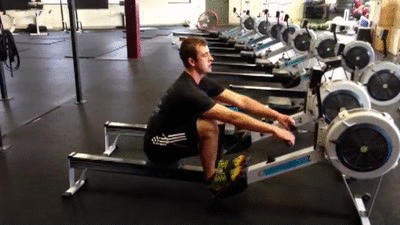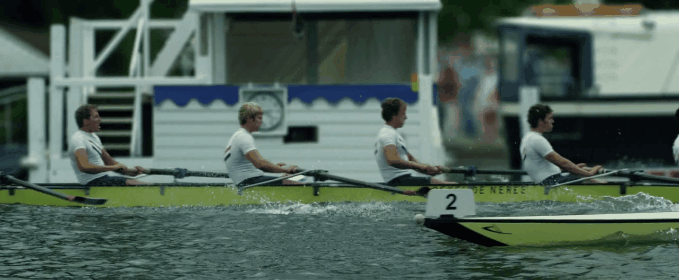Yeah, rowing’s hard. Sometimes you want to quit. But every hour you put in on the water or in the erg room doesn’t just step up your rowing game. As we bumble our way through college, we can use all the guidance we can get. And believe it or not, crew’s got you covered. Tap into what’s been drilled into you on the boat, and you may not feel so clueless.
Lessons from crew may be some of the best you learn in your college years.
1. The little things make a difference.

One of coaches’ go-to exercises for novice rowers is to order port side to lift their hands one inch. The boat immediately tips sharp to starboard. You learn the lesson fast: Hands slightly too high or too low and the row is going to feel like a first-grader riding their two-wheeler for the first time.
“I remember moments where I have been off beat by less than a second, and this causes the entire boat to lose rhythm. Crew is the ultimate team sport, where being in sync to your teammates is essential to making the boat move,” Vassar College sophomore Amanda Su said. Whether it’s keeping your eyes straight ahead in the boat or inviting that one kid in chem who always looks lost to study with you, small things can make big impacts.
2. If something’s off, start by fixing yourself.

With a sport this nitpicky, something’s off more often than not. And undeniably, our go-to reaction as we get jolted forward by the boat’s out-of-whack rhythm is to grumble internally about the incompetence of our fellow rowers. In the middle of a race or practice piece, you can’t do much about anyone else. You can only control yourself. That gets drilled in pretty quick—check your form and check your timing, even if you don’t think the problem is with you.
“Even when I might not have thought it was my fault, I would try to stay in sync with my other boat mates,” said University of Virginia freshman Stephanie Shand. If it was you, you just fixed it. Think about it—if each person readjusts when the boat gets rough, problem solved. Washington University sophomore Nile Wynar said, “Even in group work settings outside of crew, if the group isn’t working well together, I think it’s best to reflect on how you’re working with others and what you can do to help the group rather than what others should be doing.” If everyone abided by that rule in group projects, they wouldn’t be nearly as unpleasant.
3. Going it alone sucks and is not necessary.

We all do it—get it into our heads at one point or another that we can bring our best alone. I remember once doing my erg piece solo so I could pick my own playlist. (For those who don’t know, “erg” equals “rowing-machine-of-death.”) Cue the roughest workout of my life and my miserable split time showed it.
Even on a rowing machine, having your teammates beside you makes a difference. Brown University sophomore Claire Benning said, “Almost every single one of my erg pieces I’m thinking at some point, ‘This sucks I don’t want to be here,’ but rarely do I want to quit. What gets me through is my teammates, as long as they are right beside me that’s my motivation. Misery loves company.” Winning a race doesn’t happen single-handedly and surviving college doesn’t either. Rely on the people around you—even if it means compromising on music selection.
4. Anything hard has a “F–k this” point.

Seriously. Every rower is all too familiar with that stretch in an erg piece, a practice row or a race where every fiber of your being is screaming give up. Yet that not-so-fun-feeling isn’t just a rowing phenomenon. Whether that happens with an essay, a tough class or even college itself, we all reach that point from time to time where we nearly want to quit. But if rowing’s taught us anything, it’s that the quitting point and actually quitting are two different things. Once you push through, the pain of the “f–k this” point is quickly buried under the glee of completion.
5. If you want an excellent high, start something you think you can’t do and finish it.

It’s funny how quickly all the internal angst and swearing dissipates after a practice piece or race well done. You may tell yourself you can’t do it, or swear you’ll never do it again, but when you finish it—it feels good. University of Puget Sound freshman Katie Snodgrass said, “I have struggled with anxiety my whole life. After learning how mentally strong I could be after struggling my way through 2000 meters with a broken rib, I was then able to apply my strength to my anxiety. Rowing has showed me that no matter how hard something is, I can make it all the way to the finish.” And when you prove to yourself you can make it through something that hard, that confidence can carry over to the rest of your life.
6. There is a point of exhaustion at which coffee gives up on you.

When you wake up at five every morning, sleep deprivation becomes a way of life. I’ve noticed after initially feeling like death when I wake up, I’m pretty perky until halfway through my first class. Then like clockwork, I crash. Nothing sounds more sleep-inducing than a professor’s voice. Hot coffee, cold water, mint gum—rowers know all the tricks in the book for staying awake.
We also know our limits all too well and can call ourselves pros at catching up on sleep. “If the lack of sleep catches up to me in class, I will put my hat over my face and doze off for a while. I have learned that there is really no point staying awake at this point because I can’t focus anyway and my notes come out illegible,” Su said. “If you don’t have a hat, leave the class, go to the bathroom and take a five-minute nap. It helps. A lot.”
7. Never underestimate the intimidation factor of small people.

When you have a person the size of your sixth grade brother barking in your face three hours a day, you learn that appearances don’t make up everything. Coxswains double as the brains of the operation. Without a coxswain, your rowers’ strength doesn’t mean a thing. When their high voice hollers from the stern, “I’m not feeling it,” or, “Bring me up to their bow right now,” you can feel the boat jump forward with a pulse of energy. “When they get stressed out about things outside of the boat, they tend to tighten up and as a coxswain I have to remind them to stay relaxed and calm and focus back in,” UVa freshman Marissa Shand said. No matter a person’s stature or how sweet they look on the outside, don’t be fooled. The coxswain wields some serious power.
8. Calluses are sexy.

Rowers can pick out other rowers by their hands. A good indicator of a hard workout on the water is palms rubbed raw. You learn not to bat an eye at four or five blisters, but baristas often look more concerned. It’s basically a rite of passage until you have enough rows under your belt to build up calluses. Calluses mean a cause for celebration. They also garner you a good amount of street cred— the bigger the calluses, the more seasoned the rower. But if you want to get all intellectual, calluses can be metaphorical too. Calluses signal that you’ve worked at something. They show determination, grit and passion. What’s more attractive than that?
9. When everyone thinks you’re doing something batshit crazy, do it anyway.

Don’t let someone dissuade you from giving a shot to something you might love. It’s no secret that crew is hard. A lot of people don’t make it through those first few weeks. Yeah, you have to be a little insane to wake up before sunrise six days a week fall, winter and spring. Maybe more than a little. But when you stick with something that crazy, it means it’s really worth it. Vassar freshman Emma Wiley said, “Sometimes people have no idea what I’m talking about and I have to mime rowing motions before they get it. I try to impart to people how the hard work is worth that magical feeling you get on the water when its good weather, the keel is set, and everyone is perfectly focused on working hard.”
10. Nature is worth waking up for.

Getting up in the dark sucks. It just does. But I can’t describe the feeling of being out on the water at sunrise. There’s a certain tranquility, a peaceful quiet speckled with bird calls and the soft swish of oars. In the fall, the red and orange tinge to the trees on the far bank spread steadily each day like spilled paint on a green floor until it’s a wash of vibrant fire-like tones.
“There was a day when I saw a bald eagle fly over the river. At that point, I realized that this time on the water is special. The eagle, combined with the autumnal colors was just gorgeous. It’s these moments that make up for the winter practices,” Vassar freshman Aidan Glaser Schoff said. You don’t realize how oblivious humans are to the nuances of nature until you find yourself out in it day after day. And it’s pretty dang beautiful.



















